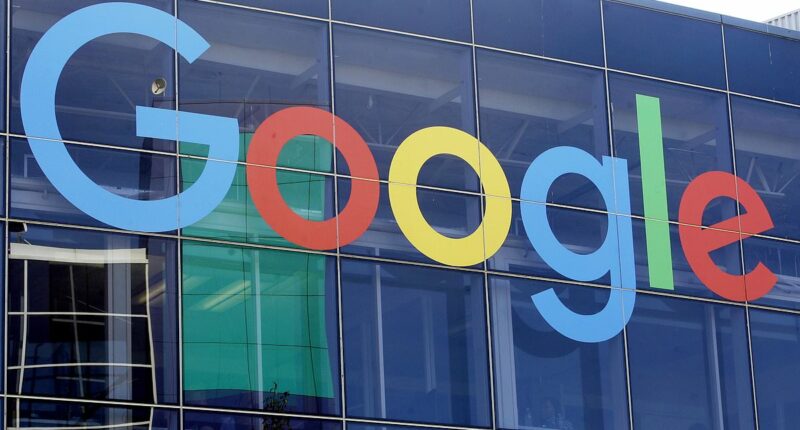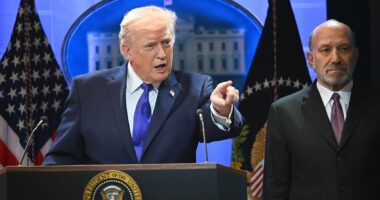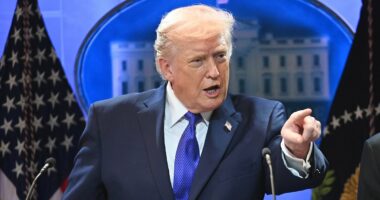Share this @internewscast.com
Google must share data with rivals to open up competition in online search, a judge in Washington ruled on Tuesday.
However, U.S. District Judge Amit Mehta dismissed a request from Donald Trump’s Justice Department that aimed to dismantle the internet giant by compelling it to sell its Chrome browser.
It was the culmination of a landmark antitrust case that imposed sweeping remedies aimed at restoring competition in online search.
This ruling was issued a year following Judge Mehta’s determination that Google unlawfully maintained monopolies in online search and related advertising, supported by exclusive distribution agreements worth billions annually.
Google CEO Sundar Pichai argued that the data-sharing policies sought by the Justice Department might enable the tech giant’s competitors to replicate its technology.
The company has already said it would appeal. That means it could be years before Google has to comply with the judge’s ruling.

In a 230-page ruling the judge also said Google would not have to sell off its Android operating system.
He stated: ‘Google will not be mandated to divest Chrome, nor will the court impose a conditional divestiture of the Android operating system in the final verdict.
‘Plaintiffs overreached in seeking forced divesture of these key assets, which Google did not use to effect any illegal restraints.’
Trump’s Justice Department, led by Attorney General Pam Bondi, contended that the Chrome browser acts as a crucial internet portal and is involved in a third of all Google web searches.
But the judge said forcing a sale of it would be ‘incredibly messy.’
The Justice Department had also argued that Google should be ordered to stop ‘compelled syndication.’
That process sees it make agreements for its search engine to be the default one used in browsers and phones.
It paid $26 billion to companies including Apple and Mozilla for such deals in 2021, and is expected to be allowed to continue.
Following the ruling, shares in Alphabet, Google’s parent company, jumped 8 percent.
Shares in Apple also immediately rose 4 percent.

Sundar Pichai, CEO of Google, will not see his company broken up following a landmark antitrust ruling

U.S. Attorney General Pam Bondi, who heads President Donald Trump’s Justice Department, argued that Google should be obligated to sell its Chrome browser.
Judge Amit Mehta had found last year that Google illegally maintained monopolies in online search through the exclusive agreements.
But in is ruling he said banning them could have too serious an impact on other businesses.
He wrote: ‘Cutting off payments from Google almost certainly will impose substantial, in some cases crippling, downstream harms to distribution partners, related markets, and consumers.’
Instead, he ordered Google to hand over search index data and user interaction information that rivals can use to improve their services.
Google must also offer syndication of search results to rivals.

Google shares rose after the ruling which did not require it to sell Chrome
Overall, the judge’s ruling was seen by experts as largely in favor of Google.
Gene Munster, managing partner, at Deepwater Asset Management, said: ‘The regulator’s bark is bigger than the bite.’
In April, Google lost a separate antitrust case over digital advertising.
A judge in Virginia, just outside Washington D.C., ruled the tech giant illegally built ‘monopoly power’ in a victory for online news publishers.
That case was also brought by the U.S. Justice Department, and the Daily Mail’s Chief Digital Officer, Matthew Wheatland, was a key witness.
Bondi called it a ‘landmark victory in the ongoing fight to stop Google from monopolizing the digital public square.’
She added: ‘Google is a monopolist and has abused its monopoly power.’

Judge Amit Mehta delivered a 230-page ruling in the case
The cases are part of a wide government offensive against alleged monopolistic practices by technology giants.
It has support from both Republicans and Democrats, and involves cases launched under both President Trump and President Joe Biden.
There are currently five pending antitrust cases brought by the U.S. government against major technology companies.

















